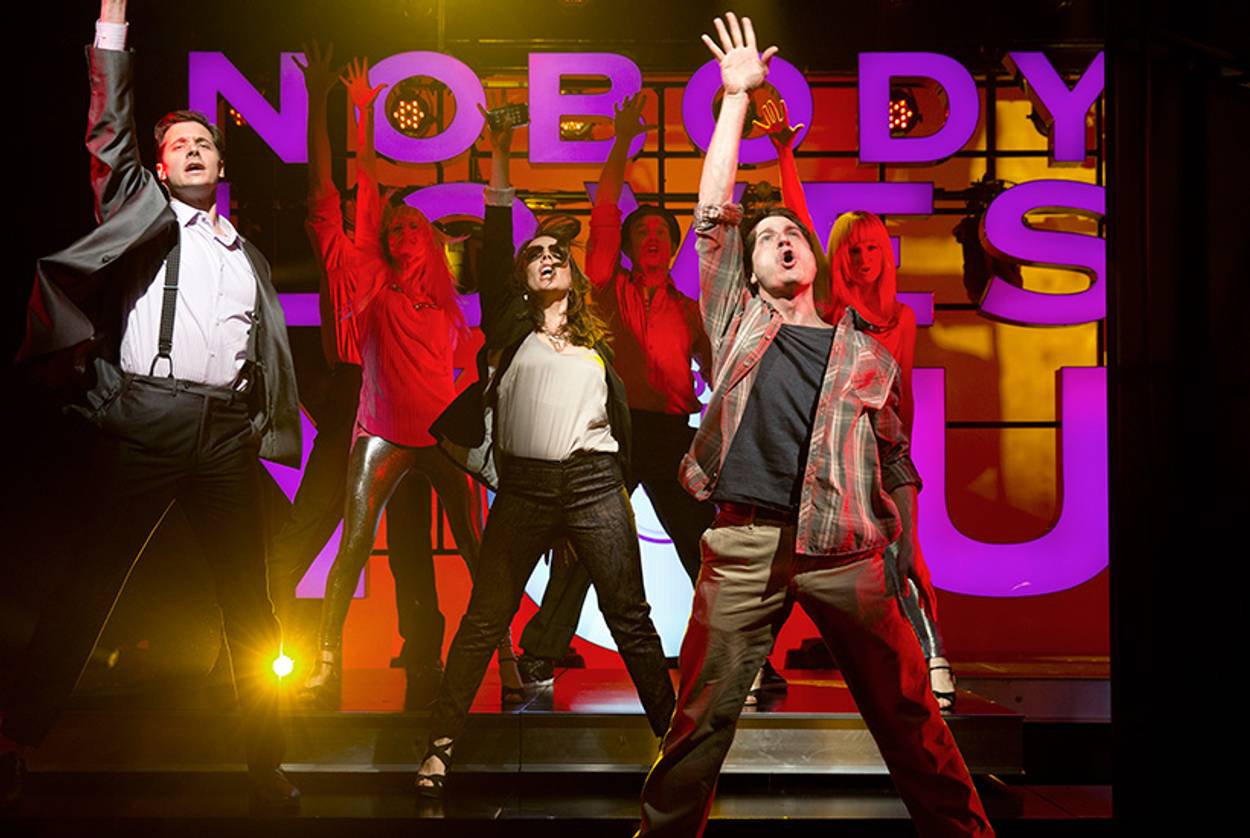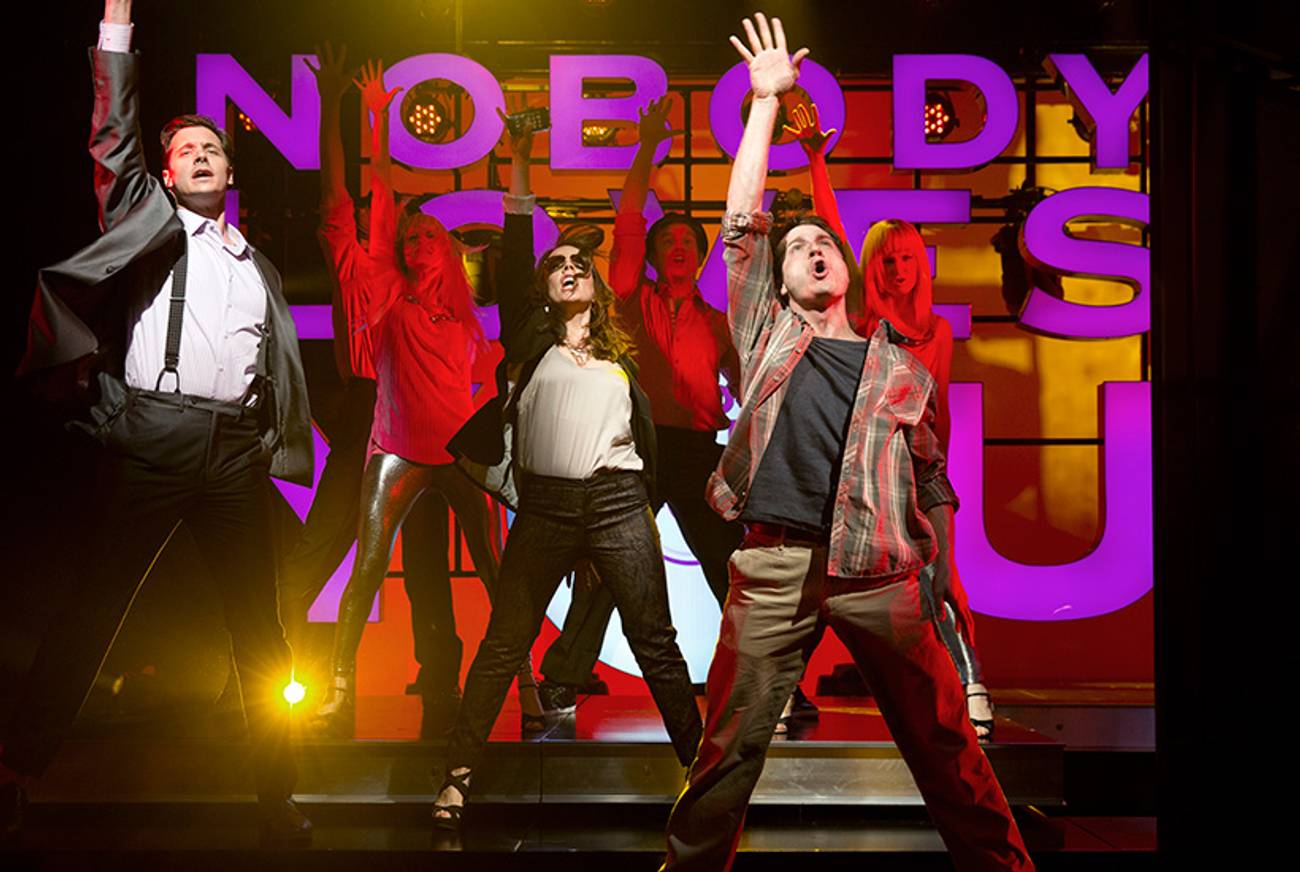A Philosophically Funny New Pop Musical Asks, What’s Love Got To Do With It?
Rising songwriter Gaby Alter brings ‘Nobody Loves You,’ about love, ontology, and reality TV, to an off-Broadway debut




“I feel like at the very top there should be more kick. It just doesn’t feel very slammin’,” Gaby Alter said softly into a microphone on a recent morning in July.
Hunched over a huge binder of sheets with musical notes tripping across the pages, 39-year-old Alter was taking the house band through sound checks from the center of the empty rows of seats of Second Stage Theater, where Nobody Loves You, an original musical that Alter created with writing partner Itamar Moses, opened Thursday to largely positive reviews. Six sound engineers—mostly bearded men with deep voices and tattoos—were scattered throughout the theater. Two sat behind Alter, discussing the finer points of the sound design with him, shouting instructions to the band, and going over the previous night’s performance to make necessary changes. It was the macho underbelly of musical theater.
“I feel like the wah should be dirtier,” Alter said into the microphone.
“You’re gonna get it dirty!” a disembodied voice responded from the gallery.
“Oh I … I want it,” Alter said absently, looking down at a crumpled yellow notebook in which he had taken notes during the previous night’s performance. “Let’s try this. Play all kick on the quarters, and I wanna hear the ba-bam very cleanly. And I don’t want you to take liberties. And it needs to flow. That’s what it needs.” The band started up again, and Alter hummed along, sometimes breaking quietly into song. At one point he looked up at me and pointed to the air. “It’s like Queen,” he said, smiling.
Dressed in a flannel shirt, jeans, and sandals, Alter, who is the son of the renowned biblical translator Robert Alter, was soft-spoken, almost (but not quite) shy. He had the chiseled looks of a matinee idol with none of the aggressive physicality; a young Tom Selleck playing a graduate student. And though he set one of his father’s Psalm translations to music, Gaby has chosen to eschew the religious and literary sublime in favor of musical theater—Young Zombies in Love (2004) and Band Geeks! (2010) before this latest New York debut—with contemporary themes and a pop aesthetic. Alter credited his musical bent not to his father, whose scholarship focuses on the musical qualities of language, but rather to his mother, who Alter said is “more into music overtly” and made him take piano lessons as a child. It seems not coincidental that Nobody Loves You should be about the things fame can and can’t get you.
The show, a “pop musical” as Alter put it, features Jeff (Bryan Fenkart), a lovesick philosophy grad student (dressed much like Alter was dressed that day) who enters a reality-TV show in search of a lost love. When that is thwarted, Jeff decides to stay on the show in order to carry out “research” for his dissertation on ontology, testing the hypothesis that the stylized and romantic idealizations of reality TV might provide insight into the nature of reality itself. Naturally, things don’t go as planned.
With a catchy and clever musical score and a funny script, the show—which debuted last year at San Diego’s Old Globe Theater—feels both classic and contemporary. The conceit of the reality show that Alter and bookwriter Itamar Moses cooked up (Alter wrote the music and co-wrote the lyrics with Moses) is that contestants compete to find love; those who don’t get chosen are ceremoniously booted with the words “nobody loves you.” It’s a perfect distillation of how these shows must seem to the educated male who feels somewhat above them.
Alter admitted that he doesn’t watch much reality TV. The idea for the show stemmed rather from a song written by Moses titled, “What’s the point of happiness if no one is watching?” Reality TV provided the conduit through which the writers could explore a more general 21st-century problem: the need for attention. “The idea was to explore why people want to be on camera,” Alter said over lunch later that day. “What is this thing that gives their life meaning? Why do people crave fame?”
In other words, the show is not about why people watch reality TV, but why they participate in it. Nobody Loves You never quite allows the audience to identify with the characters who enjoy watching its fictional reality-TV show (one of whom can’t tell the difference between ontology and optometry, and the other of whom is so flamboyantly performative that identification with an interior self is effectively precluded). “I think we were more interested in why people go on the programs, because it’s crazy,” Alter said. “But in doing so, we had to indict ourselves. We’re not immune to wanting to be famous. There’s a lot of validation from the outside. I think now I’m too old to be famous,” he added. “Being famous feels like love. It temporarily gives you that feeling.”
But being seen by an audience is a performance, Alter said, agreeing with what his protagonist Jeff says in the play: “People can perform or they can connect, but they can’t do both at the same time.” To explain the line, Alter said, “They can’t see your real self and it’s not real love and they can’t answer your need to be loved. I think you can tell when people are being inauthentic, or if people are running from something and they put on a very false persona, or if people are going on television and they really want to be presented a certain way.” The show opposes this sort of performance to the “real” self that can be known and loved only off-screen.
But if anything, the show seems to confirm not that being famous feels like love but that love feels a lot like being famous, at least the Facebook-ish, exhibitionist version of that. Nobody Loves You never conceptualizes an alternative to the fantasy of being observed, somewhat confirming that which reality TV courts—authenticity as performance—while remaining aloof from it. Indeed, in the world of Nobody Loves You and its creators, love seems like the consolation prize for the unfamous.
***
Like this article? Sign up for our Daily Digest to get Tablet Magazine’s new content in your inbox each morning.
Batya Ungar-Sargon is a freelance writer who lives in New York. Her Twitter feed is @bungarsargon.
Batya Ungar-Sargon is a freelance writer who lives in New York. Her Twitter feed is @bungarsargon.